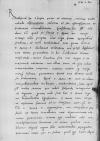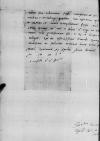 BCz, 1597, p. 1011
BCz, 1597, p. 1011
Reverendissime in Christo Pater et Domine, domine multa colende observatione.
Salutem et sui officiosissimam et fraternam commendationem.
Consilium hoc
ill(ustrissimi) or ill(ustris)⌈ill(ustrissimi)ill(ustrissimi) or ill(ustris)⌉
domini Albrecht I von Hohenzollern-Ansbach (Albrecht von Brandenburg) (*1490 – †1568), 1511-1525 Grand Master of the Teutonic Order; from 1525 to his death Duke in Prussia as a liegeman of the Polish king; son of Friedrich V of Brandenburg der Ältere and Sophia Jagiellon (daughter of Casimir IV Jagiellon), nephew of Sigismund I, King of Poland; founder of the university in Königsberg (1544)⌊ducisAlbrecht I von Hohenzollern-Ansbach (Albrecht von Brandenburg) (*1490 – †1568), 1511-1525 Grand Master of the Teutonic Order; from 1525 to his death Duke in Prussia as a liegeman of the Polish king; son of Friedrich V of Brandenburg der Ältere and Sophia Jagiellon (daughter of Casimir IV Jagiellon), nephew of Sigismund I, King of Poland; founder of the university in Königsberg (1544)⌋ vestri, quod ex litteris Vestrae Reverendissimae Dominationis accepi, etiamsi mihi propter eius erga suam rempublicam studium et rerum tractandarum eam, quam litterae Vestrae Reverendissimae Dominationis declarant, utilitatem non potest displicere. Cum tamen praevideam in hoc Lithuanico itinere conficiendo minus commodam fore cum Sigismund I Jagiellon (Zygmunt I) (*1467 – †1548), King of Poland and Grand Duke of Lithuania (1506-1548); Duke of Głogów (Glogau) (1499-1506), Duke of Opava (1501-1506), Governor of Silesia (1504-1506); son of King Kazimierz IV Jagiellon and Elisabeth of Austria⌊regia sacra maiestateSigismund I Jagiellon (Zygmunt I) (*1467 – †1548), King of Poland and Grand Duke of Lithuania (1506-1548); Duke of Głogów (Glogau) (1499-1506), Duke of Opava (1501-1506), Governor of Silesia (1504-1506); son of King Kazimierz IV Jagiellon and Elisabeth of Austria⌋ conferendi rationem, non illam tunc de iisce rebus conveniendam censerem, maxime autem quod nusquam antequam Vilnius (Wilno, Vilna), city in Lithuania, on the Vilnia river, capital of the Grand Duchy of Lithuania⌊VilnamVilnius (Wilno, Vilna), city in Lithuania, on the Vilnia river, capital of the Grand Duchy of Lithuania⌋ perventum fuerit, una diutius nocte sit commoratura. Quod Vestra Reverendissima Dominatio meis ac aliorum interpellationibus inclinata, auctoritatem suam apud
ill(ustrissimum) or ill(ustrem)⌈ill(ustrissimum)ill(ustrissimum) or ill(ustrem)⌉
dominem Albrecht I von Hohenzollern-Ansbach (Albrecht von Brandenburg) (*1490 – †1568), 1511-1525 Grand Master of the Teutonic Order; from 1525 to his death Duke in Prussia as a liegeman of the Polish king; son of Friedrich V of Brandenburg der Ältere and Sophia Jagiellon (daughter of Casimir IV Jagiellon), nephew of Sigismund I, King of Poland; founder of the university in Königsberg (1544)⌊ducemAlbrecht I von Hohenzollern-Ansbach (Albrecht von Brandenburg) (*1490 – †1568), 1511-1525 Grand Master of the Teutonic Order; from 1525 to his death Duke in Prussia as a liegeman of the Polish king; son of Friedrich V of Brandenburg der Ältere and Sophia Jagiellon (daughter of Casimir IV Jagiellon), nephew of Sigismund I, King of Poland; founder of the university in Königsberg (1544)⌋ pro nobili Ioannes Golinski ⌊GolynskiIoannes Golinski ⌋ interponere est dignata, grata mihi fuit haec Vestrae Reverendissimae erga me benevolentia<e> significatio. Si tamen tam atrox ac nefarium facinus ab eo commissum antequam ex litteris Vestrae Reverendissimae Dominationis cognovissem, non commisissem profecto, ut tanta truculentia meae deprecationis uteretur patrocinio, verum ego multorum mihi coniunctissimorum hominum et eorum, quibus non libenter aliquid negare soleo, contentionibus expugnatus, patrocinium meum pro eo scelere, quod ego levem aliquam  BCz, 1597, p. 1012 noxam sum arbitratus, fuisse interponere non sum veritus habeoque gratiam tam efficacem apud Vestram Reverendissimam Dominationem meam interpellationem fuisse.
BCz, 1597, p. 1012 noxam sum arbitratus, fuisse interponere non sum veritus habeoque gratiam tam efficacem apud Vestram Reverendissimam Dominationem meam interpellationem fuisse.
Dabo etiam operam, ut eam Vestrae Reverendissimae Dominationis erga me voluntatem mihi gratissimam esse Vestra Reverendissima Dominatio semper intelligat. Cui me officiosissime commendo quamque diutissime ac feliciter dominus Deus valere faciet hidden by binding⌈[ciet]ciet hidden by binding⌉.
 BCz, 1597, p. 1012 noxam sum arbitratus, fuisse interponere non sum veritus habeoque gratiam tam efficacem apud Vestram Reverendissimam Dominationem meam interpellationem fuisse.
BCz, 1597, p. 1012 noxam sum arbitratus, fuisse interponere non sum veritus habeoque gratiam tam efficacem apud Vestram Reverendissimam Dominationem meam interpellationem fuisse.


